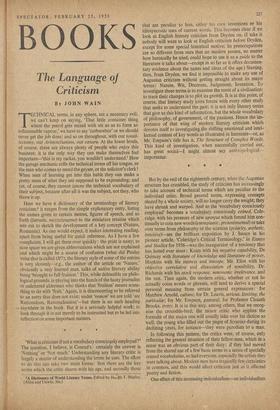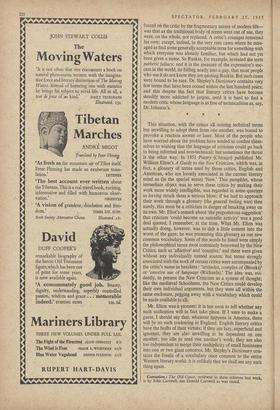BOOKS
The Language of Criticism
By JOHN WAIN TECHNICAL terms, in any sphere, are a necessary evil; we can't keep on saying, 'That little container thing where the petrol gets mixed with air so as to form an inflammable vapour,' we have to say 'carburettor' or we should never get the job done: and so on throughout, with our tonsil- lectomy, our Aristotelianism, our ccesura. At the lower levels, of course, there are always plenty of people who enjoy this business; it is the only way they can make themselves feel important—'this is my racket, you wouldn't understand.' How the garage mechanic rolls the technical terms off his tongue, or the man who comes to mend the geyser, or the solicitor's clerk! When men of learning get into this habit they can make a pretty mess of what they are supposed to be expounding; and yet, of course, they cannot ignore the technical vocabulary of their subject, because after all it was the subject, not they, who threw it up.
Here we have a dictionary of the terminology of literary criticism:' it ranges from the simple explanatory entry, listing the names given to certain metres, figures of speech, and so forth (fatrasie, mezzozeugma) to the miniature treatise which sets out to sketch the development of a key concept (Nature, Romantic). As one would expect, it makes interesting reading, apart from being useful for quick reference. As I have a few complaints. I will get them over quickly: the print is nasty: to save space we are given abbreviations which are not explained and which might be a source of confusion (what did Pindar write that is called 01?); the literary style of some of the entries is very slovenly—e.g., the author of the article on 'Nature,' obviously a very learned man, talks of native literary ability being 'brought to full fruition.' This, while defensible on philo- logical grounds, is playing into the hands of the hasty journalist or unlettered alderman who thinks that 'fruition' means some- thing to do with 'fruit.' Again, it is disconcerting to be referred to an entry that does not exist; under 'reason' we are told 'see Rationalism, Rationalisation'—but there is no such heading anywhere in the book. But it is a seriously helpful work; to look through it is not merely to be instructed but to he led into reflection' on some important matters. that are peculiar to him, either his own inventions or his idiosyncratic uses of current words. This becomes clear if we look at English literary criticism from Dryden on. (I take it nobody will want to look at English criticism before Dryden. except for some special historical motive; its preoccupations are so different from ours that no modern person, no matter how heroically he tried, could hope to use it as a guide to the literature it talks about—except in so far as it offers documen- tary evidence about the tastes and ideas of the age.) Starting, then, from Dryden, we find it impossible to make any use of Augustan criticism without getting straight about its major terms: Nature, Wit, Decorum, Judgement, Invention. To investigate these terms is to examine the roots of a civilisation; to trace their changes is to plot its growth. It is at this point, of course, that literary study joins forces with every other study that seeks to understand the past; it is not only literary terms that give us this kind of information, but the whole vocabulary of philosophy, of government, of the passions. Hence the im- portance of that wing of modern literary criticism which devotes itself to investigating the shifting emotional and intel- lectual content of key words as illustrated in literature—or, as Mr. Empson's title has it, The Structure of Complex Words. This kind of investigation, when successfully carried out, has great social—I might almost say anthropological — importance. • forced on the critic by the fragmentary nature of modern life— was that as the traditional body of terms went out of use, they were, on the whole, not replaced. A critic's coinages remained his own; except, indeed, in the very rare cases where he man- aged to find some generally acceptable term for something with which everyone was already familiar, but which had not yet been given a name. So Ruskin, for example, invented the term pathetic fallacy; and it is the measure of the expression's suc- cess in the world, its falling neatly into a gap, that most people who use it do not know they are quoting Ruskin. But such cases were bound to be rare. Dr. Shipley's Dictionary contains very few terms that have been coined within the last hundred years; and this despite the fact that literary critics have become steadily more addicted to jargon, until it is hard to find a modern critic whose language is as free of technicalities as. say. Dr. Johnson's.
This situation, with the critics a1,1 coining technical terms but unwilling to adopt them from one another, was bound to provoke a reaction sooner or later. Most of the people who have worried about the problem have tended to confine them- selves to wishing that the language of criticism could go back to being informal and non-technical; but .sometimes the thrust is the other way. In 1951 Poetry (Chicago) published Mr. William Elton's A Guide to the New Criticism, which was, in fact, a glossary of terms used by those critics, English and American, who are loosely associated in the current literary mind as (in the special sense) 'New.' This pamphlet, whose immediate object was to serve these critics by making their work more widely intelligible, was regarded in some quarters as having struck them a serious blow; if we had to approach their work through a glossary (the general feeling was) then surely, this must be a criticism in danger of breaking away on its own. Mr. Eliot's remark about 'the preposterous suggestion' that criticism 'could become an autotelic activity' was a good deal quoted. I remember, at the time. What Mr. Elton was actually doing, however, was to dab a little cement into the worst of the gaps; he was presenting this glossary as our new common vocabulary. Some of the words he listed were simply the philosophical terms most commonly borrowed by the New Critics, such as 'affective' and `conative,' and these were given without any individually named source; but terms strongly associated with the work of certain critics were accompanied by the critic's name dn brackets : 'attitudes, complex of (Brooks)' or 'emotive use of language (Richards).' The idea was, evi- dently, to present the New Criticism as a system of thought; like the medimval Schoolmen, the New Critics could develop their own individual arguments, but they were all within the same enclosure, pegging away with a vocabulary which could be made available to all.
Mr. Elton was a pioneer; it is too soon to tell whether any such unification will in fact take place. If I were to make a guess, I should say that, whatever happens in America, there will be no such coalescing in England. English literary critics have the faults of their virtues; if they are lazy, superficial and ignorant, they are also unwilling to be dependent on one another; too idle to read one another's work, they are also too independent to merge their multiplicity of small businesses into one or two giant concerns. Mr. Shipley's Dictionary con- tains the fossils of a vocabulary once common to the entire Western literary world; it is unlikely that we shall see any such thing again.
Correction : The Old Cause, reviewed in these columns last week, is by John Carswell, not Donald Carswell as was stated.











































 Previous page
Previous page